MECAM Fellows contribute to MECAM’s research agenda by working independently on their own research projects and by their active engagement in academic activities at MECAM (on site), during and beyond their stay. The concept of the fellowship program requires a good balance of freedom and time for the individual scholar to concentrate on a self-chosen research project, access to adequate research facilities, opportunities for free exchange of ideas, questions, and results with colleagues, and contributions to the MECAM Program, its activities and academic outputs. The fellowship program led by MECAM’s directors has been tested and implemented successfully during MECAM’s initial funding phase within the Interdisciplinary Fellowgroups (IFGs), even though the on-site component in Tunis has been substituted partially by remote fellowships due to pandemicrelated restrictions. During the initial funding phase, MECAM has been successful with invitations of excellent scholars working on intriguing individual research projects and the formation of groups of fellows covering a broad range of research questions relating to MECAM’s research agenda and a variety of disciplinary approaches. The individual fellowships offered during MECAM’s main phase are primarily targeted to promising postdoctoral researchers (junior fellows), as well as more experienced senior scholars (senior fellows). MECAM invites nine fellows per year for a period of eight months In addition, MECAM will invite up to six promising postdoc fellows for up to three years. A maximum of three of these three-year postdoc fellowships may run concurrently
IRF I « Aesthetics & Cultural Practices »
Interdisciplinary Research Field I “Aesthetics & Cultural Practices”, the IRF questions of how aesthetic forms and cultural practices influence the process by which models and imaginations of the future are expressed and (re-)negotiated. It also investigates the ways in which disparities, political and societal transformations influence aesthetic and cultural practices.
IRF II « Inequality & Mobility »
Interdisciplinary Research Field II “Inequality & Mobility”, The IRF addresses social and economic inequalities, the resulting sense of insecurity, and their role in the (re-)negotiation of visions and models of the future. The IRF specifically explores how distinct forms of disparity (incl. concrete policy decisions) drive or restrain mobility and how in turn, mobility can exacerbate or mitigate inequality.
IRF III « Memory & Justice »
Interdisciplinary Research Field III “Memory & Justice”, the IRF discuss legacies of the past, including their legal, political and cultural perceptions and frames in relation to different assessments of the present and to models and (re- )negotiations of the future. Research will shed light on the ways in which differential access to political power shapes questions of accountability, fact-finding, amnesty, judicial reforms, human rights claims and the legitimate sources of law in post-conflict societies and beyond.
IRF IV « Resources & Sustainability »
Interdisciplinary Research Field IV “Resources & Sustainability”, the IRF investigates how societies in general and political decision-makers in particular deal with burgeoning socio-economic disparities and growing environmental problems. This IRF studies which economic models might ensure a politically, socially and ecologically sustainable future. Especially rentier and extractivist economic models in the Maghreb/Middle East are explicitly addressed here as these models generate particular forms of disparities and thus also interesting visions of the future.
IRF V « Identities & Beliefs »
The IRF examines co-existing, sometimes competing identities and belief systems which are partly impacted by political power dynamics. Disparities are felt, perceived and articulated very differently from the vantage point of diverse identities and beliefs, resulting in pluralistic ways of (re-) negotiating imaginations and models of the future. Possible research foci are therefore on topics such as reformational Arab-Muslim thought, the future manifestation of political Islam in the Maghreb, and the entanglements of Islamic history and its interaction with modernity.
MECAM’s five IRFs are complemented by three areas of methodological exploration that cut across the research areas. Although the choice of each specific theme and its research methods is made by the fellows individually, the areas of methodological exploration address questions that may arise from the center’s specific position, and its place in the system of academic knowledge production at the intersection of Tunis and the Maghreb, Germany and Europe, as well as Area Studies and humanities and social science disciplines. They also address the central concerns and commitments of MECAM’s work.
The five topics Interdisciplinary Research Fields (IRF), a process that will be accompanied by the academic expertise of Principal Investigators (PI) from Germany and Tunisia. This will enable broader interdisciplinary and comparative exchange between fellows conducting research on the five key areas.
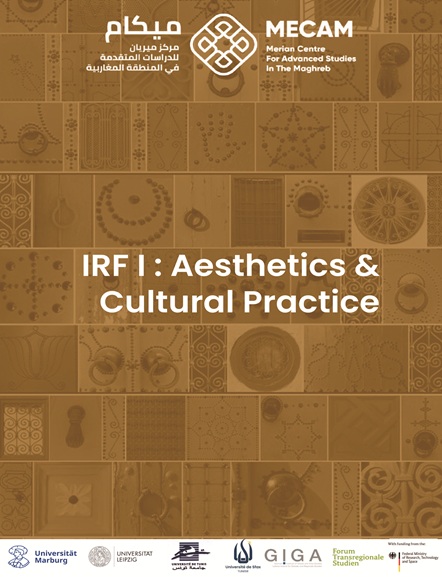
Prof. Olaf Müller (Professor, French and Italian Literature and Culture, Marburg/Germany)
Prof. Fiederike Pannewick (Professor, Arabic Literature and Culture, Marburg/Germany)
Prof. Malte Hagener (Professor, Media and Film Studies, Marburg/Germany)
Prof. Samia Kassab-Charfi (Professor, French and Francophone Literatures, Tunis/Germany)
Prof. Mohamed Ben Hamouda (Department of Music and Department of Arts and Crafts, Université de Sfax/Tunisia)
Prof. Emna Beltaief (Professor of French language and literature, University of Tunis/ Tunisia)
Georges Khalil (ForumTransregionaleStudien, Berlin)
Dr. Christian Junge (Marburg University, Marburg )
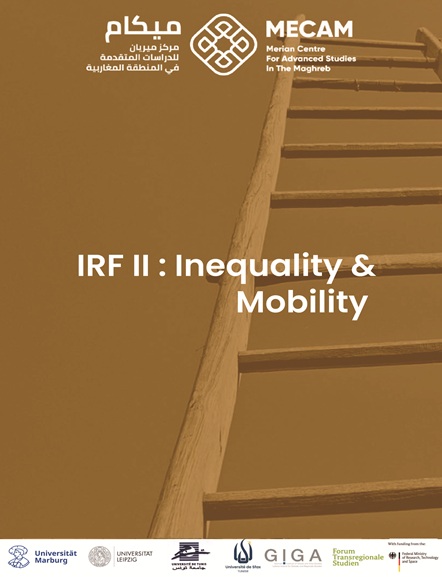
Prof. Sonja Ganseforth (Research Associate, Economic Geography and Labour Market Research, University of Leipzig/ Germany)
Prof. Ali Bennasr (Professor, Geography, Université de Sfax/ Tunisia)
Prof. Mourad Ben Jelloul (Professor, Geography, Université de Tunis/ Tunisia)
Prof. Ahmed Khouaja (Professor, Historical and cultural sociology, Université de Tunis/ Tunisia)
Prof. Mohamed Ali Benzina (Professor, Demography, Université de Tunis/ Tunisia)
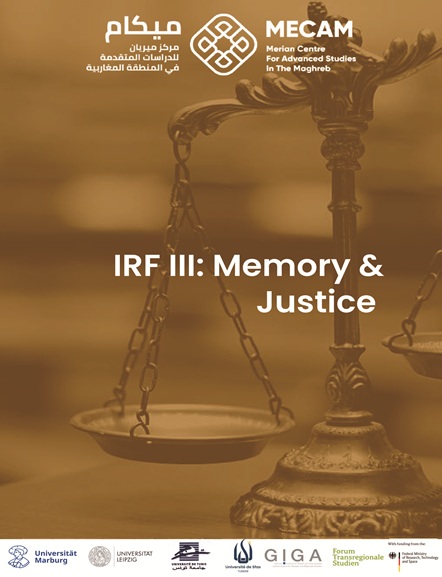
Prof. Susanne Buckley-Zistel (Professor, Peace and Conflict Studies, Philipps-Universität Marburg/Germany)
Prof. Anika Oettler (Professor, Sociology, Philipps-Universität Marburg/Germany)
Prof. Thorsten Bonacker (Professor, Peace and Conflict Studies, Philipps-Universität Marburg/Germany)
Prof. Khaled Kchir (Professor, History, Université de Tunis /Tunisia)
Prof. Yasmina Ghodbane (Professor, Philosophy, Université de Tunis /Tunisia)
Prof. Nessim Zenaien (Professor, Postcolonial/Colonial Studies of the Maghreb, Philipps- Universität Marburg/ Germany)
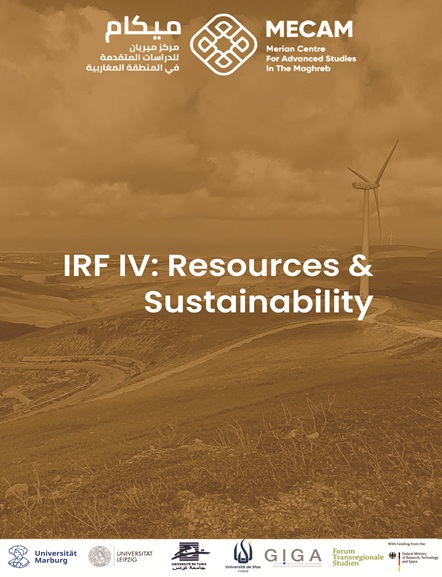
Prof. Rachid Ouaissa (Professor, Middle East Politics, Center for Near and Middle East Studies (CNMS) and Director of MECAM, Philipps-Universität Marburg / Germany)
Prof. Benedikt Stcuhtey (Professor, Modern History, History and Cultural Studies, Philipps- Universität Marburg / Germany)
Prof. Eckart Conze (Professor, Modern and Contemporary History, History and Cultural Studies, Philipps-Universität Marburg / Germany)
Prof. Nejiba Chkir Ben Jemaa (Geography and Environment / Dean of the Faculty of Arts and Humanities of Sfax, Université de Sfax/Tunisia)
Prof. Anissa Ben Hassine (Professor of Management, ESSECT – Ecole Supérieure des Sciences Economiques et Commerciales, University of Tunis / Tunisia)
Prof. Héla Belkhiria (Lecturer, Electrical Engineering, National Engineering School of Tunis (ENSIT), University of Tunis / Tunisia)
Prof. Lamia Rouached (Associate Professor, Quantitative Methods and Economics, Institut supérieur de gestion de Tunis, University of Tunis / Tunisia)
Prof. Adel Karaa (Professor in the Department of Quantitative Methods and Economics and Director of the Doctoral School at the University of Tunis – ISG Tunis / Tunisia)
Dr Katharina Nicolai (Friedrich-Alexander-Universität Erlangen-Nürnberg/Institut für Politische Wissenschaft / Allemagne )
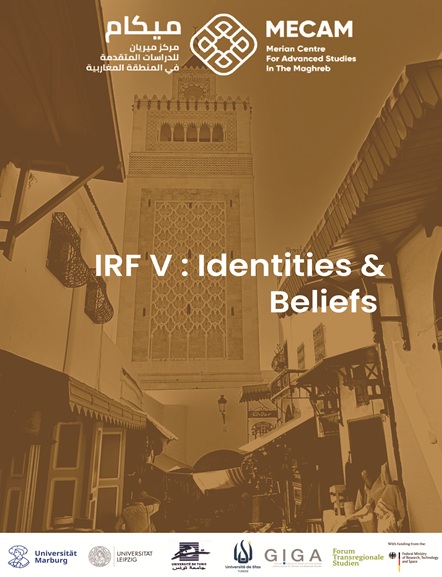
Dr. André Bank (Senior Research Fellow, Institute for Middle East Studies, German Institute for Global and Area Studies (GIGA) / Germany)
Prof. Fadma Aït Mous (Professor, Sociology, Aïn Chock Faculty of Letters and the Humanities, Hassan II University of Casablanca / Morocco)
Prof. Zoubir Arous (Professor, Sociology, University d’Alger II / Algeria)
Prof. Sihem Chérif (Professor, Sociology, University d’Alger II / Algeria)
Dr. Anis Nouaïri (Maître de conférences en langue, littérature et civilisation françaises / Université de Tunis /Tunisie)
Dr. Jihen Souki (Maître-assistante en langue, littérature et civilisation françaises / Université de Sousse /Tunisie)
